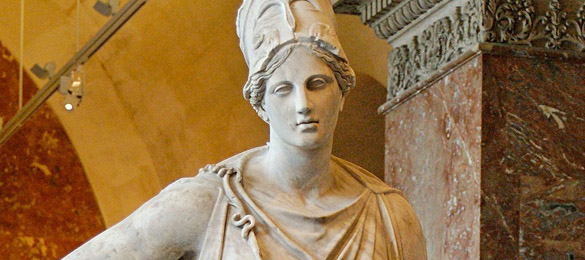Ancient and Medieval Studies Concentration

"Mattei Athena,” located in the Louvre Museum; Roman copy of the Greek goddess of wisdom, from 1st century BC/AD, after a 4th century BC Greek original, attributed to Cephisodotos or Euphranor. Photograph by Jastrow (2006); public domain via Wikimedia Commons.
Through a wide variety of subjects drawn from a number of disciplines, this program provides a curricular framework for exploring topics in ancient and medieval studies which range from the history of ideas and institutions to that of material artifacts, literature and certain of the original languages. The chronological span of the program includes some 6,500 years between 5000 B.C. and 1500 A.D.
The goal of this program is to develop knowledge and understanding of the more distant past both for itself, in its uniqueness, and as an object of specifically modern questions and methods of inquiry. We are interested in the structure of institutions and social systems, and in relationships between the social order and learned traditions, values, ideologies and ideas. Ancient and medieval studies derive a special claim to our interest from the fact that the record is so full and multiform and that much of it is of exceptionally high quality at once in substance and form.
The concentration requirements consist of four subjects, at least one of which is to be taken in the medieval period by students whose focus is to be the Ancient World, or one in the ancient period by those whose focus is the Middle Ages. Subjects listed below as ANCIENT AND MEDIEVAL may count for either. At least two of the subjects taken towards the concentration must be taken at MIT. A HASS Concentration may include only one subject that also counts toward the HASS Distribution Requirement. You may include more than one only if the additional subject will NOT count as a HASS Distribution subject in your degree audit.
Concentrators may count up to two subjects in Greek or Latin or a medieval vernacular (taken at MIT or other institutions) towards the concentration. Students interested in the program should contact the Concentration Advisor.
ANCIENT AND MEDIEVAL
4.605 A Global History of Architecture, HASS-A
21H.007J Empire: Introduction to Ancient and Medieval Studies [21L.014], HASS-H, CI-H
21H.230 Barbarians, Saints, and Emperors, HASS-H
21H.333 Early Christianity, HASS-H
21L.001 Foundations of Western Literature: Homer to Dante, HASS-H, CI-H
21L.021 Comedy, HASS-H, CI-H
21L.607 Greek I [6-unit course] **
21L.608 Greek II [6-unit course] **
21L.611 Latin I [6-unit course] **
21L.612 Latin II [6-unit course] **
CC.117J Humane Warfare: Ancient and Medieval Perspectives on Ethics in War [17.05], HASS-H, CI-H
ANCIENT
3.981 Communities of the Living and the Dead: the Archaeology of Ancient Egypt, HASS-S
3.982 The Ancient Andean World, HASS-S
3.983 Ancient Mesoamerican Civilization, HASS-S
3.986 The Human Past: Introduction to Archaeology, HASS-H, CI-H
3.987 Human Evolution: Data from Palaeontology, Archaeology, and Materials Science, HASS-S
3.993 Archaeology of the Middle East, HASS-S
21H.130 The Ancient World: Greece, HASS-H, CI-H21H.132 The Ancient World: Rome, HASS-H, CI-H
21H.237 The City of Athens in the Age of Pericles, HASS-H
21H.239 The City of Rome in the Age of the Caesars, HASS-H
21H.331 Julius Caesar and the Fall of the Roman Republic, HASS-H
21H.336 The Making of a Roman Emperor, HASS-H
21L.455 Ancient Authors, HASS-H
21L.458 The Bible, HASS-H
21L.613 Latin Readings [6-unit course] **
21L.614 Advanced Latin Readings [6-unit course] **
24.200 Ancient Philosophy, HASS-H
MEDIEVAL
4.614 Building Islam, HASS-A
4.635 Early Modern Architecture and Art, HASS-A
21H.133 The Medieval World: CE 200-1500, HASS-H
21H.134J Medieval Economic History in Comparative Perspective [14.70J], HASS-S, CI-H
21H.160 Islam, the Middle East, and the West, HASS-H
21H.238 The Vikings, HASS-H
21H.240 The World of Charlemagne, HASS-H, CI-H
21H.383 Technology and the Global Economy, 1000-2000, HASS-S
21L.460 Arthurian Literature, HASS-H
21L.601J Old English and Beowulf [24.916J], HASS-H
21M.220 Medieval and Renaissance Music, HASS-A
CC.116 How to Rule the World: The Promises and Pitfalls of Politics, War, and Empire, HASS-H, CI-H
This list is not exhaustive. Relevant subjects that are no longer offered and subjects with variable topics (such as “special subjects” or “selected topics” courses, for example) may also be counted at the discretion of the concentration advisor.
[ ] Jointly listed subjects
** These two 6-unit classes may be combined by petition to form one 12-unit HASS-Elective
Additional information can be obtained from the Concentration Advisors:
Professor Stephanie Frampton, 14-434, 617-253-4452
Professor Eric Goldberg, E51-290, 617-324-2420
Or from the History Office, E51-255, x3-4965
Or by emailing shass-ug@mit.edu.
For more AMS information, click here.